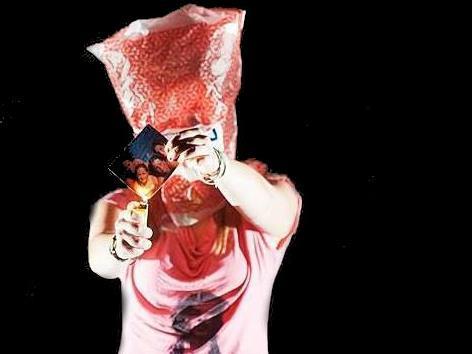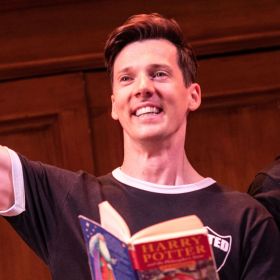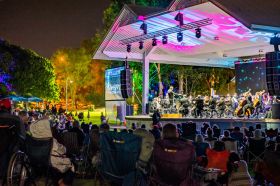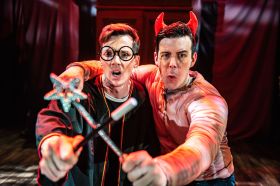Image: Ontroerend Goed’s Teenage Riot at the Melbourne Festival.
For many years, theatre made by young people has been regarded somewhat condescendingly by mainstream audiences – sometimes even by mainstream theatre makers.
As Fraser Corfield, Artistic Director of Australian Theatre for Young People (atyp) recalls: ‘I remember sitting in a forum in Copenhagen with a bunch of professional artists from all around the world who create work for young audiences, talking to them about the fact that we create work with young people as well, and someone said in disgust, “Ugh! Young people can never create work of quality; they don’t have the training!”’
Such attitudes are beginning to diminish, thanks in part to the work of companies such as Belgium’s Ontroerend Goed, whose trilogy of works created by young people but intended for adult audiences, have been internationally successful.
In the words of Sarah Austin, Artistic Director of St Martins Youth Arts Centre: ‘I think that that work, its being seen by Melbourne audiences, has assisted St Martins, enabled us to have a lot of conversations with the mainstream companies about the work that we’re making.’
She believes that youth arts is ‘coming out of a wilderness of misunderstanding at the moment. It’s a practise that’s permeated by conceptions of amateur, disorganised, unprofessional theatre – exactly the same assumptions that people have about Fringe – and in some ways that word ‘emerging’ has started a process of transformation, to become a kind of positive attribution and be seen as work that is professional, work that is excellent.
‘I still think we are absolutely battling the misconceptions of youth theatre, but what is interesting is that audiences, in particular Melbourne audiences, have developed a relationship through Melbourne Festival with the idea that children can make work for adult audiences, and that that work can be absolutely excellent and critically rigorous.’
In Sydney, atyp has developed a number of works in conjunction with mainstream theatre companies, including Belvoir’s critically acclaimed Medea, Corfield said.
‘I think [Ontroerend Goed] have certainly been a real beacon for demonstrating that there’s a potential international market for young work, but look, the prime example of it was Belvoir’s production of Medea last year, that we supported, which was driven by Rory Potter and Joseph Kelly. Those actors were 12 and 13 and they very much drove that play. Blazey [Best] kind of pops in and out as Medea, but otherwise it’s just the two kids on stage for an hour and 10 minutes.
‘And that piece was developed very much using a youth art form philosophy; it was created through a series of structured improvisations based around the ideas and interactions of those two young actors, to the extent that it received massive interest nationally and internationally, but Belvoir stated that they could only tour it as long as they were able to tour it with those two boys, because they were intrinsic to the development of the work.
‘I think what’s becoming exciting is that this is something that … has been very much the realm of youth arts companies for a long time, and I think what professional companies are starting to recognise is that youth arts companies specialise in this area. But we’re certainly seeing an infiltration of the main stage,’ he said.
In Melbourne, St Martins are taking advantage of this cultural shift to develop two new works created by the company’s youth ensemble, but very much intended for adult audiences.
‘We’ve created an ensemble of 12 kids who are aged between five and 21 … and that ensemble works with us across a course of two years, so we develop a relationship with them; and the work we develop is not kids acting, and it’s not text based – it’s really about reflecting the anecdotal and personal experiences of the ensemble, and in doing so we hope that what we reflect is the universal and the particular about the experience of childhood – and Australian childhood in particular,’ Austin explained.
Two new works are currently being developed with the ensemble; a performance work about the changing way children experience the world as they age, Before the Dark Hour of Reason Grows, which will have a development showing at the end of the month; and Soundtracks, a theatrical intervention.
‘Soundtracks is a contemporary art intervention into opera and ballet. So essentially the experience is an audience member sitting in the State Theatre, watching the Australian Ballet and wearing a headset, and into that headset whilst they watch the ballet and hear the orchestra, there are children live interpreting the experience of what’s happening on stage and what they’re hearing and seeing. Very political and highly subversive, but an extraordinary way to watch canonical theatre; and an extraordinary way to think about the stories, the myths, the kind of cultural artefacts of ballet and opera and how they relate to a contemporary child’s experience of our world.’
Fraser Corfield welcome such changes and challenges to the existing theatrical landscape.
‘In some ways, when you look at the evolution of youth arts practise or theatre practise in Australia over the last 50 years, everything’s been evolving pretty quickly, and I think this is probably, naturally, the next extension of it,’ he said.
‘One of the things that I think is quite interesting when you look at art forms in general is that, obviously the music industry is significantly built on creating work that speaks directly to young people and celebrating young people as artists. And I think we’ve seen that in film, we’ve seen that in television and literature; it was just a matter of time before it happened in theatre. I think we’re just at the beginning of a relatively exciting period in theatre where that is beginning to take place.’
St Martins Youth Arts Centre
stmartinsyouth.com.au
Australian Theatre for Young People
www.atyp.com.au





